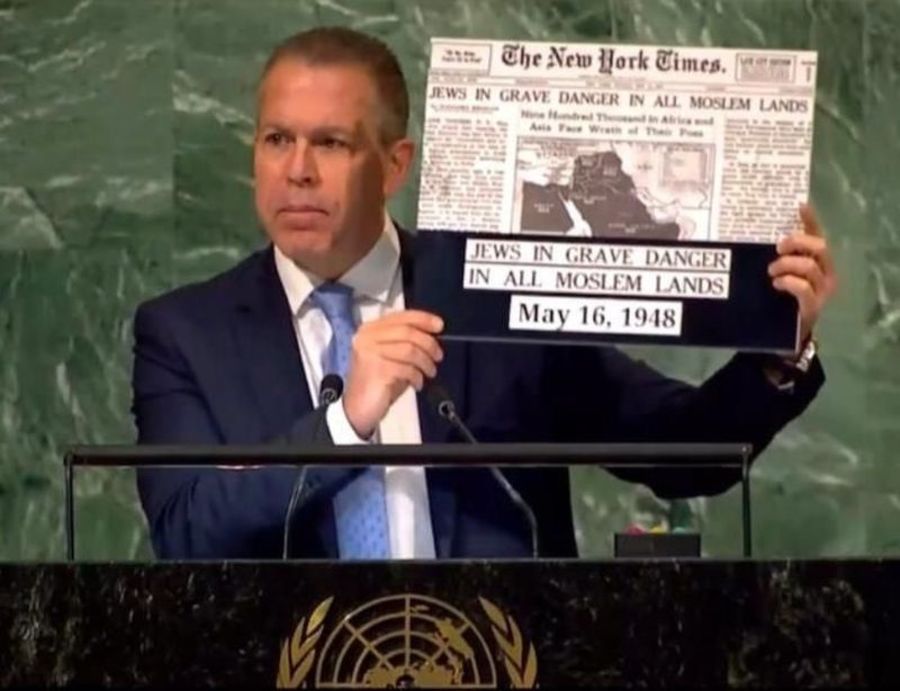UN will recognize ‘Nakba Day’ – ‘Day of Catastrophe’ – as Israel’s Independence Day, for first time
The United Nations General Assembly voted in December to adopt the Muslim world’s lamentation over the birth of the modern State of Israel

For the first time, the United Nations General Assembly will observe Palestinian “Nakba Day” on May 15, to lament 75 years of Israel's independence. Nearly every Middle Eastern country, including members of the Abraham Accords, voted in favor of the resolution to recognize the birth of the Israel in 1948 as a 'Day of Catastrophe' for the Muslim world, particularly Palestinians.
The UN passed the resolution in December to observe Nakba Day, calling for “a high-level event at the General Assembly Hall.” Following the vote, Palestinian envoy to the UN, Riyad Mansour, described it as seeing “this General Assembly … finally acknowledge the historical injustice that befell the Palestinian people, adopting a resolution that decides to commemorate in this General Assembly Hall the 75th anniversary of the Nakba.”
Palestinians have accused Jewish fighters – many of whom survived the Holocaust only to pick up arms in defense of the nascent State of Israel – of committing atrocities and of forcibly expelling Arabs across the country following Israel's victory in the 1948 War of Independence.
It is generally agreed that, in the days leading up to Israel’s War of Independence and during the first few weeks of the war, around 700,000 Arab residents of Britain’s Mandatory Palestine fled both from the areas set apart for a Jewish state in the UN’s 1947 Partition Plan (Resolution 181) and from the areas chosen to be part of a future Arab state.
“Commemorating the Nakba must be at the top of our priorities in order to preserve our narrative, which we must adhere to and convey to the whole world,” Palestinian Authority President Mahmoud Abbas said.
The creation of the Mandate of Palestine followed a previous partition of British territories taken from the Ottoman Empire. In that partition, the territory of Palestine, which the British originally intended for Jewish settlement alone, was separated from the territory called Transjordan.
Transjordan, in 1946, would become the Hashemite Kingdom of Jordan. However, Arab nations rejected the idea of a Jewish state and did not agree to the UN Partition Plan.
Nakba Day has been observed by some Arabs since 1949, when those who were displaced and living under Jordanian rule in Judea and Samaria – also known as “the West Bank of Jordan" – protested the failure of the Arab League armies to drive out the Jews.
According to Palestinian author Tamir Sorek, the first Nakba Day observance was initiated in part by the Muslim Brotherhood, as well as student groups. The date became more widely adopted in 1988 during the First Intifada, or “uprising” against Israel, and after the Palestine Liberation Organization (PLO) called on Palestinians to commemorate May 15 as a day of mourning. Thus, the day was expanded to be observed by some Arabs in the territories that Israel recaptured from Jordan in 1967, as well as internationally.
In 1998, then-PLO leader Yasser Arafat inaugurated May 15 as a “national day of mourning.”
Many Israelis are offended by the commemoration of Nakba Day, not as a memorial day but because of its explicit reference to Israel’s Independence Day on May 15, 1948. As Israel’s Independence Day is usually celebrated according to the Hebrew calendar, the date for the commemoration shifts each year in relation to the Gregorian calendar.
After the UN's December vote, Israel’s Ambassador to the UN Gilad Erdan held up a copy of The New York Times from May 16, 1948, with the headline: “Jews in grave danger in all Moslem lands.”

Erdan asked those in the General Assembly: “What would you say if the international community celebrated the establishment of your country as a disaster? What a disgrace.”
Erdan noted that the Jews agreed to the UN partition plan, while it was the Arab side who rejected it and fought to destroy the Jewish state.
The ambassador said that Jews living in the Middle East and in North Africa “did not revolt against the international community’s decision. They did not try to annihilate another people. Their only crime was being Jewish. This is the true ‘Nakba.’ This is the disaster carried out against the Jewish people and this is the disaster that this body has ignored for decades.”
It is estimated that about 850,000 Jews living in Arab and Muslim nations were expelled or fled during the 20th century. Many of them came from North Africa, including Morocco, Algeria and Tunisia, while others fled or were driven away from Egypt, Libya, Iraq, Yemen, Turkey, Lebanon, Syria and Iran.
Most of these countries now have very small Jewish populations, some numbering fewer than 100 people.

The All Israel News Staff is a team of journalists in Israel.














